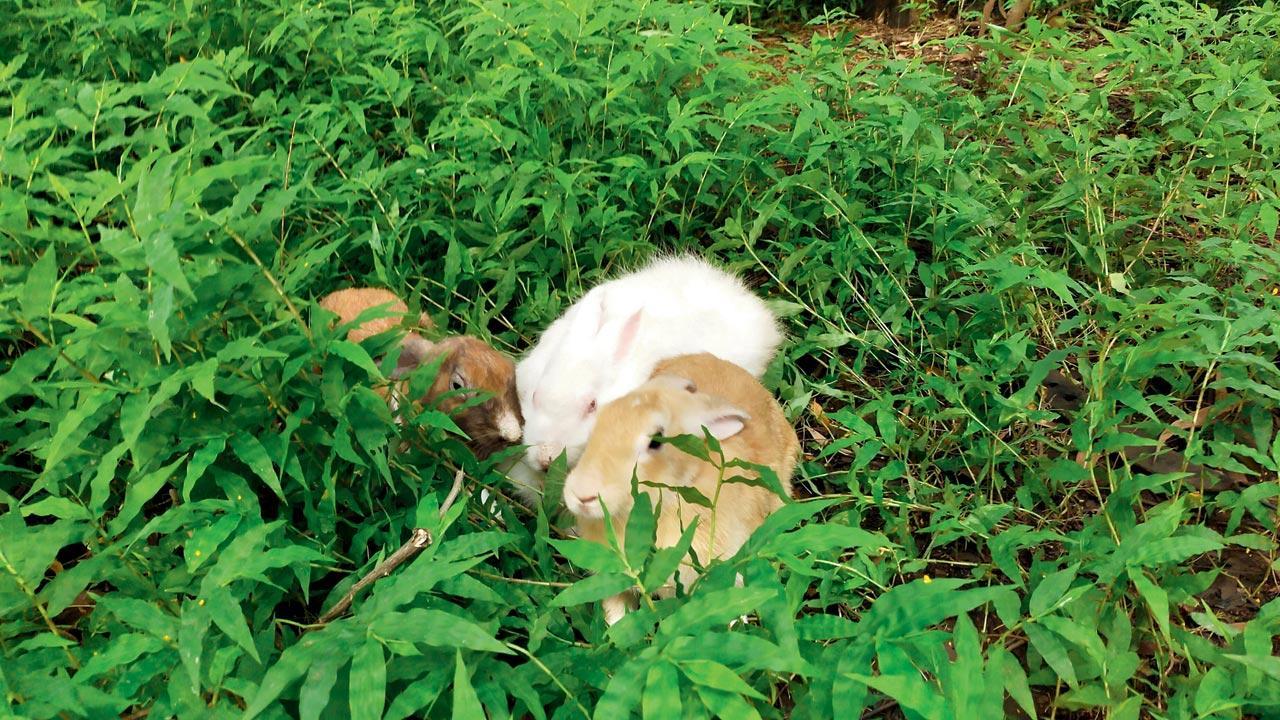Three rabbits were abandoned there recently; experts warn that these pets are often ill and might pass on the disease to wildlife that could prey upon them

The local resident who saw the abandoned rabbits said they appeared to have a skin disease
After dogs, now other pets are being dumped at Aarey Milk Colony. Recently, three rabbits were abandoned and wildlife experts have raised concerns that pets which sometimes are carriers of dangerous diseases, might pass them on to leopards or other wild animals who could prey on them.
ADVERTISEMENT
Local residents have been complaining that several times a month they come across abandoned dogs and other pets, which are left in the forest in the night by pet owners. As these rabbits are not a protected species, the Forest Department did not rescue them.
Speaking to mid-day, a local resident, Satish Lot said, “Aarey is an isolated area and post sunset it becomes easy for pet owners to abandon animals. Several times we come across abandoned pet dogs and cats roaming on the road. In many cases they are either ill or old.”
‘Dangerous to wildlife’
Talking to mid-day the resident, who spotted the rabbits said, “I was shocked to see the three rabbits abandoned on the side of the road. What is more worrisome is the fact that most of the animals that are abandoned are ill and might end up passing their diseases to wild animals.”
Zoonotic diseases associated with rabbits include salmonella and leptospirosis (both caused by bacteria), vector borne diseases like Babesiosis (red blood cells are infected in this ) and Ehrlichiosis (causes fever, chills, headache, muscle aches)
Abandoning pets/exotic species in wild habitats is also a violation of the Wildlife Protection Act, 1972 and the Prevention of Cruelty to Animals, 1960. According to wildlife experts and conservationists, the introduction of non-native species is not just dangerous for the abandoned animal, bird or reptile, but also for the native wild population.
Speaking to mid-day, Honorary Wildlife Warden of Thane, Pawan Sharma said, “There are high risks of non-native species, exotics, pets which are kept and raised in captivity of being carriers of various diseases, which can further spread to the native wild population impacting the whole food chain. We already have an example of RES Red-Eared Slider Turtle and Alligator Gar along with many other species found in Powai lake threatening our native population of turtles and fish which are important to maintain an ecological balance.”
Sharma also said that they had seen a pattern in rise of people buying pets during the lockdown and now as things are opening up they have come across cases of dumping and abandoning their pets.
“Aarey colony and Sanjay Gandhi National Park have witnessed many such cases of abandoning pets in the past few years, which is inhumane, illegal and unethical. If found dumping or abandoning pets in protected or non-protected areas, the person can be booked under various sections of the International Union for Conservation of Nature, Convention on International Trade in Endangered Species, Customs, IPC, WPA, PCA with both fine and imprisonment,” added Sharma.
Assistant Commissioner, Wildlife, Dr Shailesh Pethe said, “It will set a dangerous precedent if exotic pets and dogs are abandoned in protected areas. It can introduce new pathogens leading to diseases for which wildlife has zero natural immunity.”
 Subscribe today by clicking the link and stay updated with the latest news!" Click here!
Subscribe today by clicking the link and stay updated with the latest news!" Click here!






